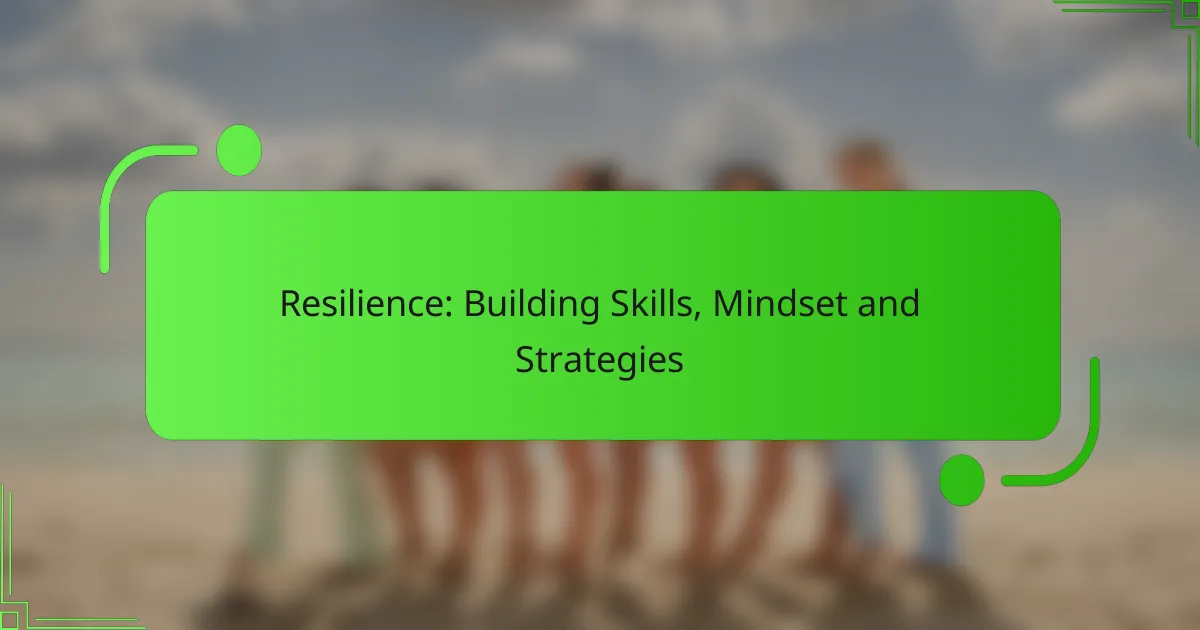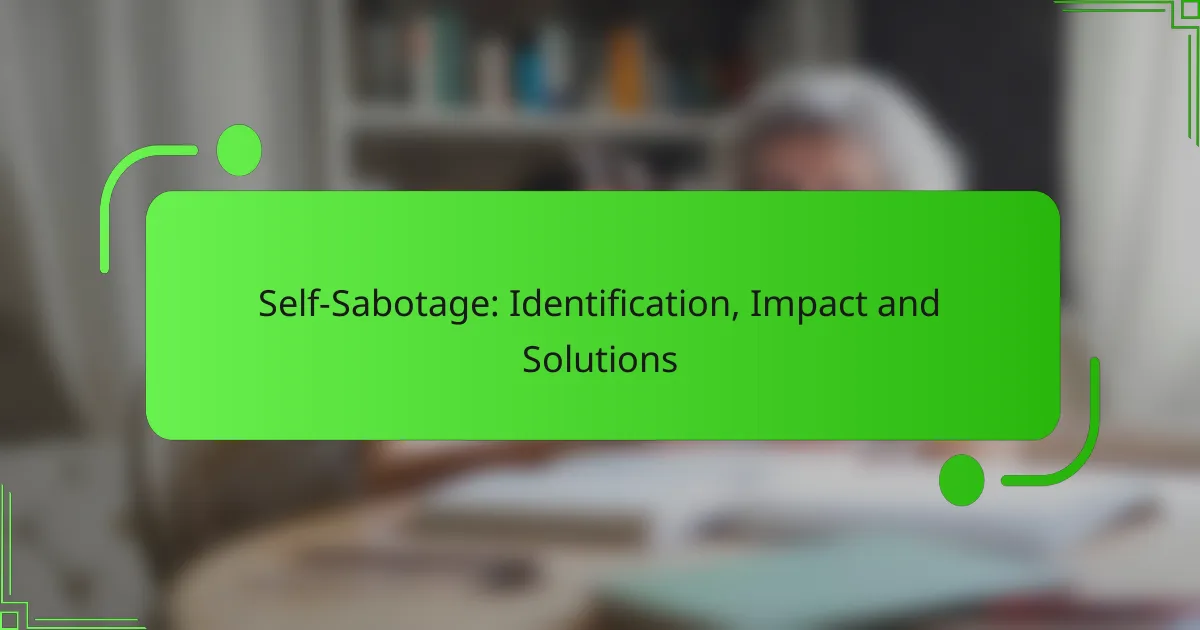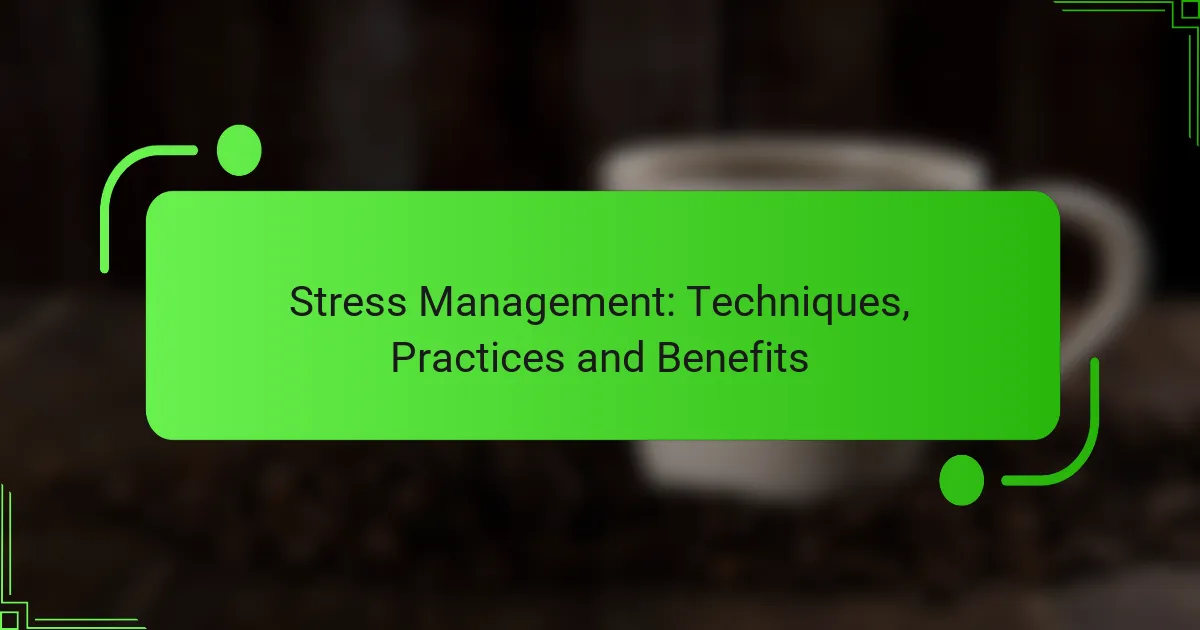Resilience is a vital skill that can be cultivated through intentional practices aimed at enhancing mental strength and coping strategies. By focusing on mindset training, skill-building, and fostering social connections, individuals can develop a robust approach to navigating life’s challenges. Embracing a positive mindset not only shapes perceptions of adversity but also encourages proactive problem-solving, essential for overcoming obstacles.
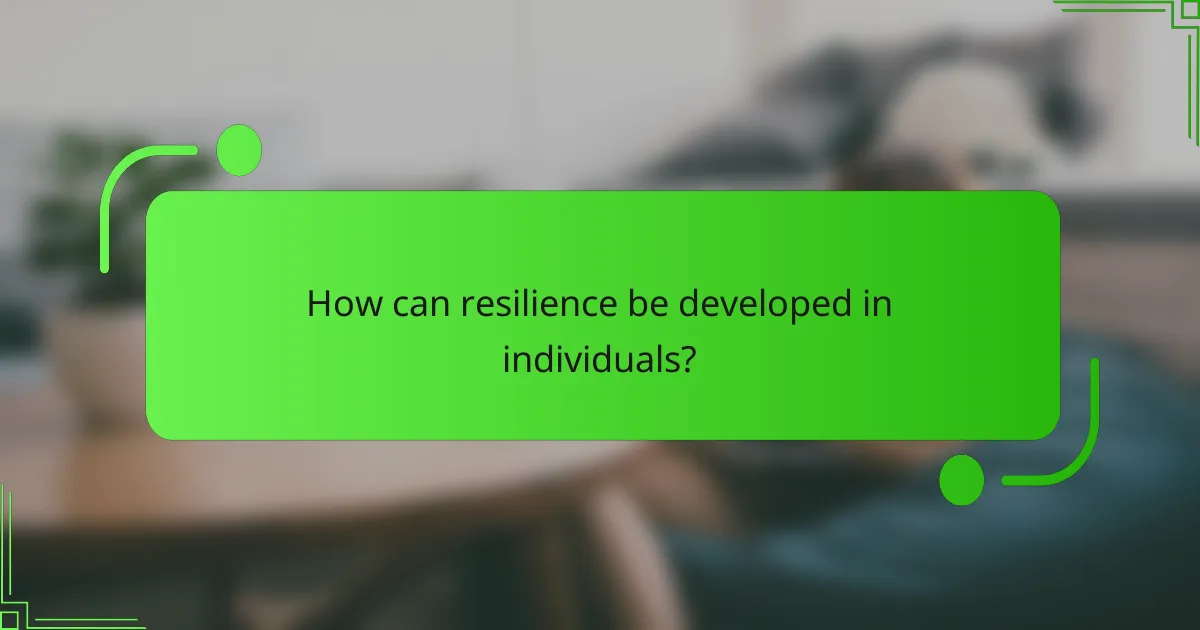
How can resilience be developed in individuals?
Resilience can be developed through intentional practices that enhance mental strength, coping strategies, and social support. By focusing on mindset training, skill-building, and community involvement, individuals can cultivate a more resilient approach to life’s challenges.
Mindset training techniques
Mindset training involves adopting a growth mindset, which emphasizes the belief that abilities can be developed through dedication and hard work. Techniques such as positive affirmations, visualization, and mindfulness meditation can help individuals reframe negative thoughts and build confidence.
Practicing gratitude daily can also enhance resilience by shifting focus from challenges to positive aspects of life. Keeping a gratitude journal, where individuals note things they are thankful for, can foster a more optimistic outlook.
Skill-building workshops
Participating in skill-building workshops can equip individuals with practical tools to navigate adversity. Workshops that focus on stress management, problem-solving, and emotional regulation provide participants with actionable strategies to handle difficult situations effectively.
Look for local community centers or online platforms offering these workshops. Many programs are available at low or no cost, making them accessible for a wide range of participants.
Supportive community involvement
Engaging with a supportive community can significantly enhance resilience. Joining groups or organizations that share common interests can provide a sense of belonging and emotional support. This connection can be vital during challenging times.
Consider volunteering or participating in local events to foster relationships with others. Building a network of supportive peers can create a safety net that individuals can rely on when facing difficulties.
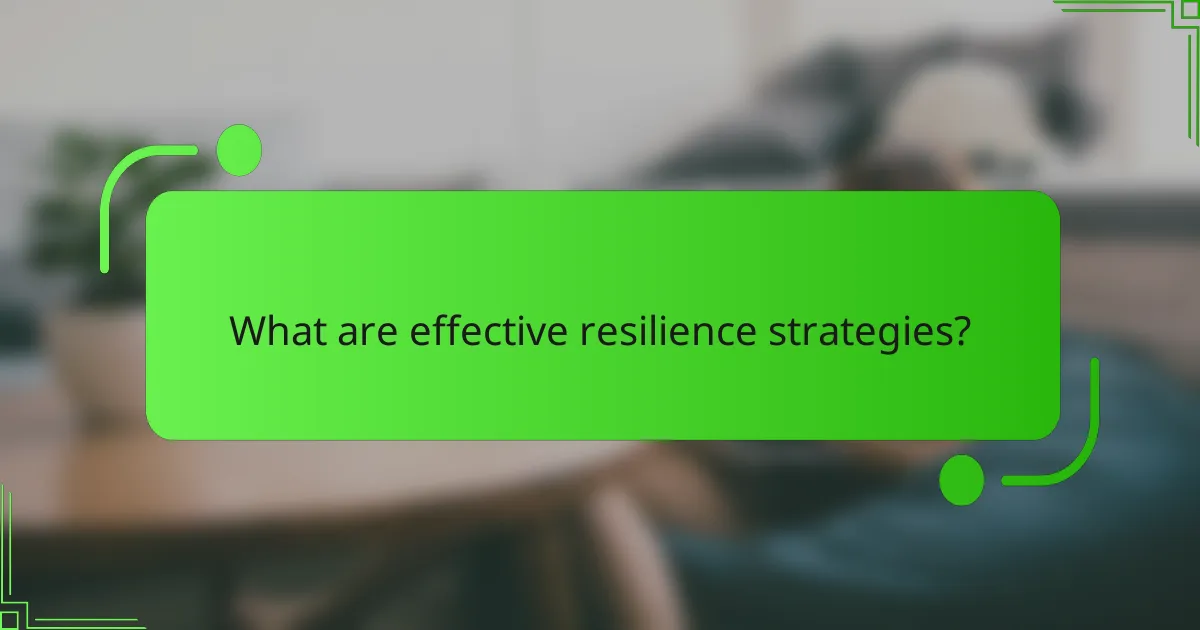
What are effective resilience strategies?
Effective resilience strategies are techniques and approaches that help individuals cope with stress and adversity, enabling them to bounce back from challenges. These strategies can be developed through various frameworks and practices that enhance mental strength and adaptability.
Goal-setting frameworks
Goal-setting frameworks provide structured methods for defining and achieving personal objectives, which can enhance resilience. Popular frameworks include SMART (Specific, Measurable, Achievable, Relevant, Time-bound) and OKRs (Objectives and Key Results), which help clarify goals and track progress.
When setting goals, ensure they are realistic and broken down into manageable steps. This approach not only makes large tasks less daunting but also fosters a sense of accomplishment as each milestone is reached.
Stress management practices
Stress management practices are essential for maintaining resilience in the face of challenges. Techniques such as mindfulness meditation, deep breathing exercises, and regular physical activity can significantly reduce stress levels and improve emotional well-being.
Incorporating these practices into daily routines can be beneficial. For instance, dedicating just 10-15 minutes a day to mindfulness can help clear the mind and enhance focus, making it easier to handle stressors effectively.
Adaptability exercises
Adaptability exercises train individuals to adjust their thoughts and behaviors in response to changing circumstances. Techniques such as role-playing scenarios or engaging in problem-solving tasks can enhance flexibility and creative thinking.
Consider practicing adaptability by exposing yourself to new experiences or challenges regularly. This could involve learning a new skill or taking on a project outside your comfort zone, which can build confidence and resilience over time.
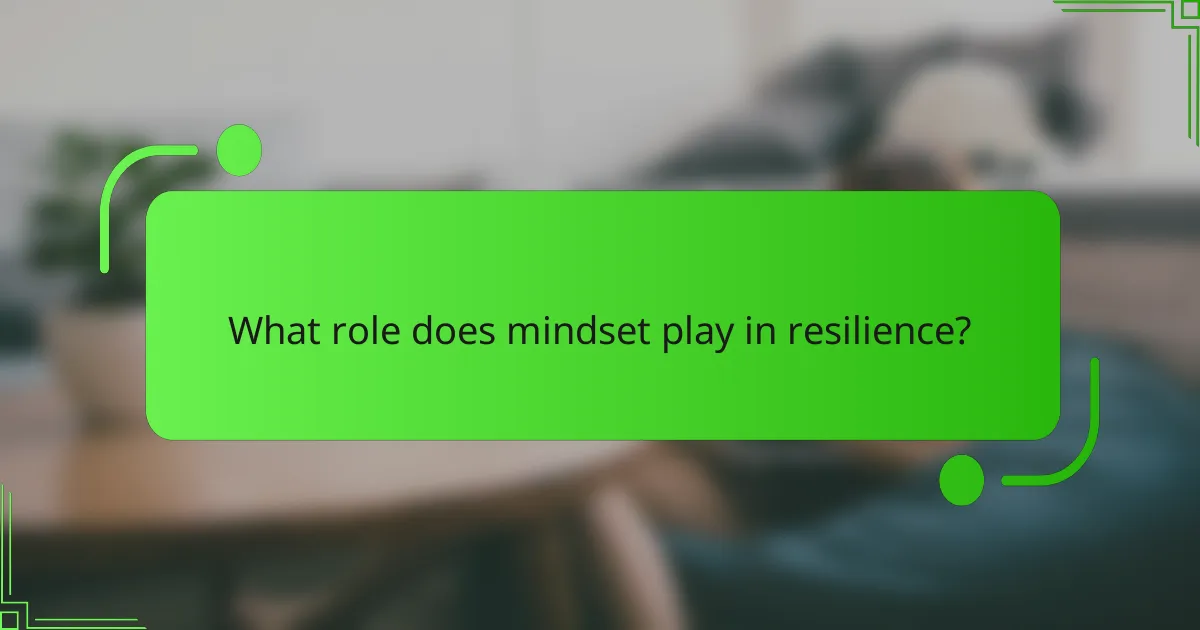
What role does mindset play in resilience?
Mindset significantly influences resilience by shaping how individuals perceive challenges and setbacks. A positive mindset fosters adaptability and encourages proactive problem-solving, which are essential for overcoming difficulties.
Growth mindset principles
Growth mindset principles emphasize the belief that abilities and intelligence can be developed through dedication and hard work. This perspective encourages individuals to view challenges as opportunities for growth rather than insurmountable obstacles.
To cultivate a growth mindset, focus on embracing challenges, persisting in the face of setbacks, and learning from criticism. For example, when faced with a difficult task, remind yourself that effort and practice can lead to improvement over time.
Positive self-talk methods
Positive self-talk methods involve consciously replacing negative thoughts with constructive affirmations. This practice can enhance resilience by boosting confidence and reducing anxiety during stressful situations.
To implement positive self-talk, start by identifying negative statements you often make, such as “I can’t do this.” Replace them with affirmations like “I am capable of overcoming this challenge.” Regularly practicing this can help reinforce a resilient mindset.
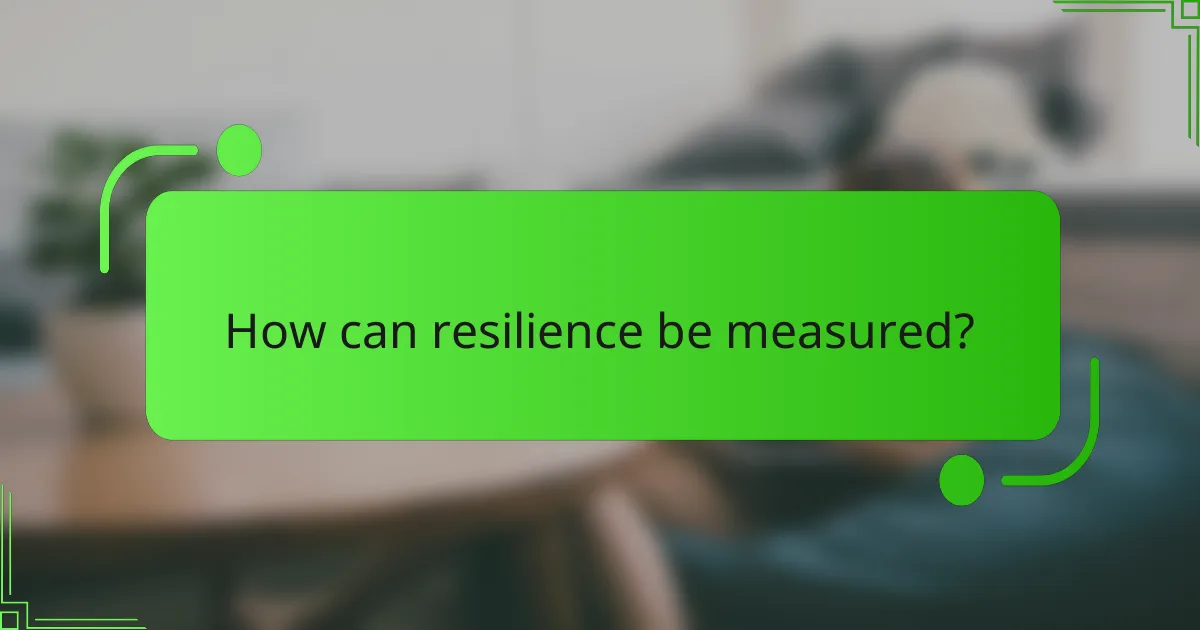
How can resilience be measured?
Resilience can be measured through various qualitative and quantitative methods that assess an individual’s ability to cope with stress and adversity. Common approaches include standardized assessments, self-evaluations, and observational techniques that provide insights into resilience levels.
Resilience assessment tools
Resilience assessment tools are structured instruments designed to evaluate an individual’s resilience. These tools often include questionnaires and surveys that gauge responses to stressors and challenges. Popular examples include the Connor-Davidson Resilience Scale (CD-RISC) and the Resilience Scale for Adults (RSA), which provide scores that help identify areas for improvement.
When choosing an assessment tool, consider the context in which it will be used. For instance, workplace resilience assessments may focus on professional challenges, while personal assessments might address family or health-related stressors. Ensure the tool is validated and reliable for your specific needs.
Self-evaluation techniques
Self-evaluation techniques encourage individuals to reflect on their coping strategies and emotional responses to adversity. Journaling is a practical method, allowing individuals to document their thoughts and feelings during challenging times, which can reveal patterns in resilience. Another technique is the use of resilience scales, where individuals rate their perceived ability to handle stress on a scale of 1 to 10.
To effectively self-evaluate, set aside regular time for reflection and be honest about your strengths and weaknesses. Consider using prompts such as “What challenges have I overcome?” or “How did I respond to stress?” This practice can foster greater self-awareness and help identify areas for growth in resilience.

What are the benefits of resilience training?
Resilience training offers numerous benefits, including improved coping mechanisms, enhanced emotional well-being, and better overall performance in challenging situations. By developing resilience, individuals can navigate stress more effectively and maintain a positive outlook even during difficult times.
Improved mental health
Resilience training significantly contributes to improved mental health by equipping individuals with tools to manage stress and anxiety. Techniques such as mindfulness and cognitive restructuring help in reframing negative thoughts, leading to a more balanced emotional state.
Participants often report lower levels of depression and anxiety after engaging in resilience training. Regular practice can foster a sense of control and optimism, which are crucial for mental well-being.
Enhanced problem-solving skills
Building resilience enhances problem-solving skills by encouraging a proactive approach to challenges. Individuals learn to assess situations critically, identify potential solutions, and evaluate outcomes effectively.
For instance, resilience training often includes scenario-based exercises that simulate real-life challenges, allowing participants to practice and refine their decision-making abilities. This hands-on experience can lead to quicker and more effective resolutions in actual situations.
Greater emotional regulation
Resilience training promotes greater emotional regulation, enabling individuals to manage their emotions in high-pressure situations. Techniques such as deep breathing and self-reflection help in recognizing emotional triggers and responding appropriately.
By developing this skill, individuals can reduce impulsive reactions and maintain composure, which is essential in both personal and professional environments. This ability to regulate emotions contributes to healthier relationships and improved communication skills.
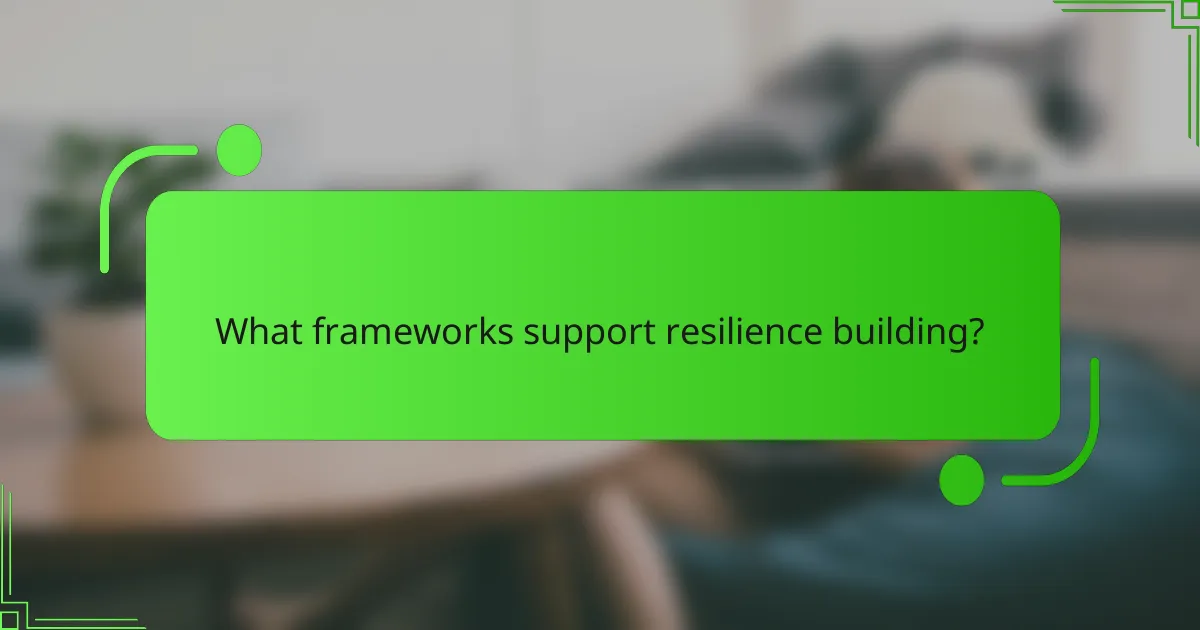
What frameworks support resilience building?
Several frameworks exist to support resilience building, focusing on mental, emotional, and social aspects. These frameworks provide structured approaches to developing resilience skills, fostering a mindset conducive to overcoming challenges.
Psychological resilience models
Psychological resilience models emphasize the mental processes that enable individuals to adapt to stress and adversity. These models often include components such as emotional regulation, optimism, and social support, which play crucial roles in resilience.
One widely recognized model is the Resilience Framework, which outlines key factors such as personal strengths, social networks, and coping strategies. Understanding these components can help individuals identify areas for growth and improvement.
To effectively apply psychological resilience models, consider assessing your current coping strategies and support systems. Regularly practice mindfulness techniques and engage in social activities to strengthen your resilience over time.
